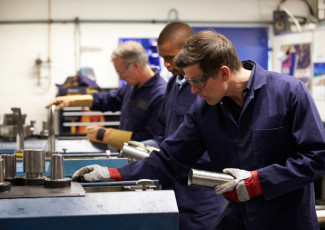College Coaches Help High School Students Better Choose Their Pathways
By Reyna Gobel
January 8, 2015
Ivy Tech Community College is placing staff in high schools to provide students with additional career and college information.
For some high school students, the decision to continue on to higher education depends on whether they can find a job after their high school graduation. So when the economy improved in Evansville, Ind., Ivy Tech Community College saw enrollment decrease.
Ivy Tech wasn’t the only higher education institution to experience this enrollment drop. Over one-third of Indiana’s high school graduates aren’t continuing their education, according to Jonathan Weinzapfel, Ivy Tech’s chancellor.
To help high school students better understand their post-graduation career and educational options, Ivy Tech created the College Connection Coach initiative. Through this program, Ivy Tech-trained coaches meet with students at high school counseling offices twice a week to offer career and college readiness information.
We found out more about how this program got started, how it operates and future growth plans.
Is a College Connection coach the same as a high school guidance counselor? No. The College Connection coaches’ duties are different from those of the high school guidance counselors. High school counselors research scholarships, track application deadlines and administer the SAT and other tests. The College Connection coaches focus on educating students on the career opportunities available to them if they earn associate degrees and career certificates. The coaches also work with school guidance counselors, administrators and teachers to help students earn college credit while still in high school.
How did Ivy Tech establish the relationships with the Evansville high schools start? Conversations about the College Connection Coach initiative came from Ivy Tech’s partnerships with high school administrators in developing and operating a dual-credit program. In addition, Weinzapfel and Rene Hankins, Ivy Tech’s executive director of outreach, regularly meet with superintendents and assistant superintendents of Ivy Tech feeder school districts.
How are the college coaches trained? The first College Connections coach started on October 1, 2014, and worked in two Evansville high schools. She was already an Ivy Tech employee and needed a short orientation on how high schools function. The second coach, hired in November 2014, was a former high school counselor and underwent a 10-week orientation at Ivy Tech. During the orientation, she met with professors, student services representatives and admissions deans, among others on campus. Currently, six College Connection coaches are working in local high schools.
What is the future of the College Connection Coach initiative? “We’d like to have coaches in all 25 counties that our college services,” Weinzapfel says. That goal will take a few years to realize, given the time it takes to build relationships with the high schools and to understand how coaches call fill the information gaps.
Three tips for college leaders considering similar coaching initiatives:
- Create mutually beneficial partnerships. When pitching a college coaching program to high school administrators, don’t just talk about how it will help their students. For instance, Weinzapfel and his staff sell the College Connection Coach initiative to high schools by also talking about how state funding is tied to students’ college preparedness.
- Consider timing. Starting a coach in the middle of March doesn’t make sense because high school seniors have already selected their colleges by then. Weinzapfel prefers to start coaches during the middle of summer, giving them time to prepare for the fall semester.
- Think about community needs. By 2025, Indiana will face 675,000 unfilled jobs because workers won’t have the appropriate postsecondary degrees or certificates, according to the Indiana Career Council. “In order to help high school students focus on high-demand careers, we had to know that data,” Weinzapfel says.













